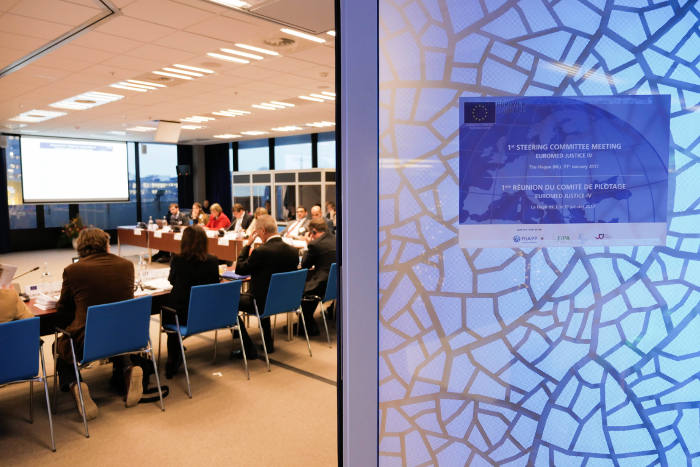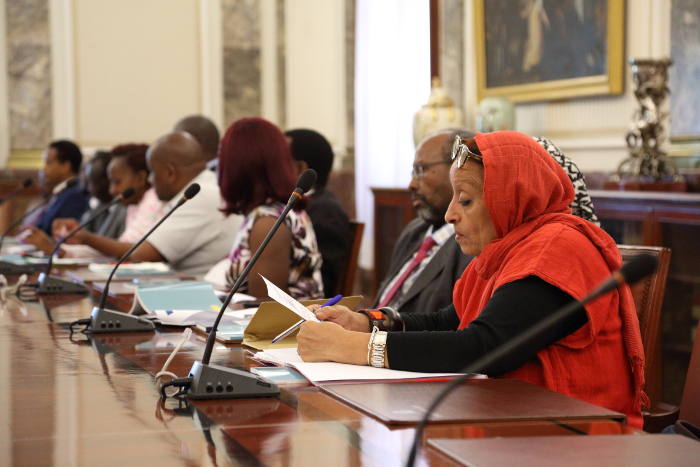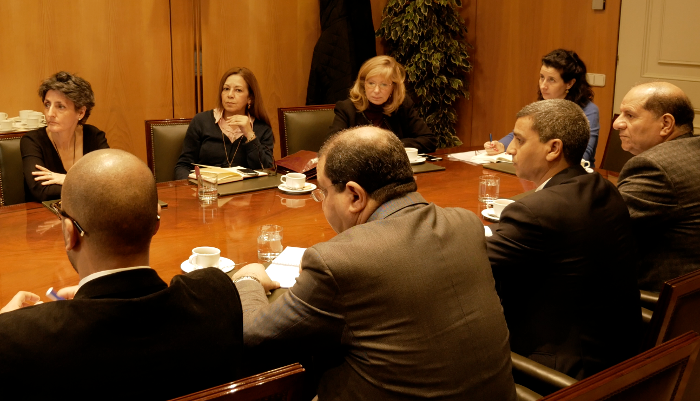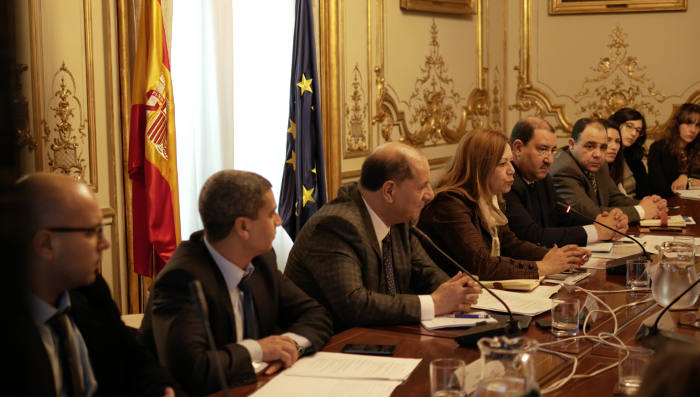-
|
28 June 2018
|Posteado en : Reportage
The revolutions in North Africa and in the Middle East initiated democratic reforms, but also left space for threats such as terrorism. In both cases, cooperation has played and continues to play a determining role
In 2011, people took to the streets of the Middle East and North Africa. The Arab world called for democracy and rights in their countries through popular protests that were included in the concept of Arab Spring. Seven years later, the changes are not entirely noteworthy. Armed conflicts and terrorism have curtailed many of those expectations. However, political, economic and social reforms were initiated, which in some cases continue to develop at a slower pace.
These are processes in which cooperation has played and can play a determining role, contributing experiences from other countries that have gone through similar situations or confronting threats that slow down development. In this context of transition, several projects in the region are managed by FIIAPP with European Union funding. Those that have to do with justice and security particularly stand out.
Tunisia was the first country where revolution was mentioned. Since then, “there has been a first democratic election, a constituent government and an approval of the Constitution in 2014”. This was explained by Ángel Llorente, coordinator of the project to accompany judicial reform in the country that ends this year. The objective has been to carry out “an organisational reform as a consequence of the process of democratic transition” in the Ministry of Justice. And to create from there an independent judiciary that had never existed in Tunisia.
Despite some resistance that could have meant a step backwards, Llorente believes that civil society will not let that happen: “They are very aware of their rights, I think it is very difficult that they could now give up something that has cost them a lot to achieve”. An enthusiasm that reminds him of Spain a few years ago.
EuroMed Justice IV is also committed to improving judicial systems. In this case, in the southern region of the Mediterranean. Algeria, Egypt, Israel, Jordan, Lebanon, Libya, Morocco, and Syria are working together with the Spanish and French Ministries of Justice to create an efficient, democratic system that respects human rights and is consistent with international regulations .

Meeting of EuroMed Justice IV in The Hague In its fourth phase, the project is also part of the EU’s neighbourhood strategy. Most of these countries are included in the European Neighbourhood Policy, which was revised precisely in the context of the Arab world revolutions to provide better support in their democratic transitions. After all, its main objective is to strengthen relations with neighbouring countries in the community space, based on common values – democracy, human rights and the rule of law – and to promote greater economic integration, mobility and stability.
Relationships that, in the case of EuroMed Justice IV seek a necessary international judicial cooperation, according to Victoria Palau, coordinator of the project. “There are problems, such as terrorism, cybercrime and human trafficking, that, if not resolved at the regional level, are impossible to address,” she says. In this context, the project witnessed the first declaration of collaboration between European public prosecutors and the Mediterranean countries, to work together to address these problems.
Judicial cooperation is also one of the components of the project for the application of the Rule of Law in the Horn of Africa and Yemen, the objective of which is to fight against security threats. In particular, it works to improve the capabilities of the intelligence services, the security forces, and the prosecutors and courts.
Eritrea, Ethiopia, Kenya, Somalia, Sudan, South Sudan, Uganda, Yemen and Djibouti are the countries that benefit from this project funded through the Instrument for Stability and Peace (IcSP). What happens in these countries, even if they are not included in the neighbouring region of the EU, does affect the continent.
In addition, it is an example of how terrorist groups take advantage of moments of political instability to act. “When there is a power vacuum, these groups always try to sneak in with more or less success,” says Javier Vega, project coordinator. In the end, terrorism is an increasingly global threat with an important focus in this geographical área.

Visit of judicial authorities from the Horn of Africa to the State Attorney General’s Office The key is to act regionally so that it does not spread to the rest of the world. For example, by controlling the territory as is also done in the Sahel region – through the Rapid Action Groups – and in Niger, more focused on illegal immigration.
The European Security Agenda underlines the need to take measures to deal with this threat in a more effective and comprehensive way, including the international community and cooperation projects. One of the latter, also managed by FIIAPP, focuses specifically on the fight against terrorism in the MENA region (Middle East and North Africa).
Work that, according to Mariano Guillén, director of the Justice and Security Area with FIIAPP, also seeks to “strengthen the political dialogue within the Arab League”, to favour cooperation among the countries of the region. Morocco, Algeria, Tunisia, Libya, Egypt, Jordan, Lebanon, Iraq, Syria and Palestine are the countries that, despite their political, economic and social differences, work to find common responses to terrorism. “The terrorist threat does not distinguish the levels of development in the countries and it can only be attacked through cooperation,” says Mariano Guillén.
The instability of the changes leaves room for security threats that do not recognise borders. But the same changes are necessary if we see them as an opportunity to improve, as a good time to draw on similar experiences while working together on those problems that affect us all.
-
|
01 March 2018
|Posteado en : Interview
Andrés Mahnke, National Defender of the Chilean Public Penal Defender and General Coordinator of AIDEF, talks about the challenges in the region and the projects which are being undertaken with the support of the European Union financed EUROsociAL+ Programme.
Public Defender’s Offices are key stakeholders in Latin America, for guaranteeing access to justice for incarcerated people and ensuring that they can exercise their fundamental rights. What are the main challenges to ensuring that the region’s Public Defenders are able to exercise an effective public defence?
These fall under three categories. Conceptually, although it may initially seem contradictory, Public Defence is not a support service for poor people. It is the representation of the legal protection that the State must guarantee as a basic right. Presenting it in any other way allows the State to shirk its responsibility and directly affects equality before the law, especially for the most vulnerable.
The next dimension refers to institutional aspects. The technical independence of defenders and the institutional autonomy that ensures this independence, funding, resources for hiring and training, salary equivalence with the other parties involved in the system, the capacity and funding to conduct in-house research, the provision of infrastructure that allows clients to be assisted in a suitable manner and information technologies that ensure a defence on equal terms with criminal prosecution.
Finally, the qualitative dimension aims to ensure defence standards and a system that monitors compliance with them. Public Defenders in the Americas and the Caribbean have made significant progress in this regard through AIDEF. If we did not take this aspect into account, we would be providing lawyers who would have no way of effectively representing the interests and rights of the defendants.
The EUROsociAL+ action in the area of justice is oriented towards expanding and strengthening the coverage of the assistance services provided by Public Defender’s Offices in order to humanise and dignify attention to people in vulnerable conditions. Which vulnerable groups face the greatest obstacles to accessing justice due to the limited recognition of their status?
The situation in Latin America shows us that native peoples, migrants and the prison population are the most vulnerable when it comes to their dignity and rights. The same is true for young people, women, especially those who are in prison, the LGBT population, and disabled people.–– All of them are linked by the main factor involved in vulnerability and discrimination, poverty.
At the regional level, EUROsociAL+ works in close collaboration with the Inter-American Association of Public Defenders (AIDEF), supporting progress in building common strategic reference responses and frameworks for regional public policies, the adoption of joint agreements, declarations and guidelines and the development of protocols or other common products. What is the added value of networking for the Latin American Public Defenders?
Firstly, defending the full validity and effectiveness of Human Rights and the guarantees recognised in international agreements on the subject, which is also one of AIDEF’s objectives. Acting together in a coordinated manner has a real impact on debates that it would be difficult to sustain in isolation. It allows a permanent, inter-institutional system for the coordination and cooperation of Public Defenders to be established with the aim of raising the standards of each individual defence system.
Finally, acting as a network within the framework of the Inter-American System for Human Rights notably increases the leverage of the defence institutions that succeeds in lessening the structural deficiencies that many of them have.
We are currently working with AIDEF on diagnosis and action guidelines for Public Defenders in cases of institutional violence so as to respond to cases of torture or institutional violence in prisons. According to recent diagnoses, despite the fact that more than 30 years have passed since the signing of the International and Inter-American Conventions to prevent and sanction torture, there are still major challenges in Latin America when it comes to institutional violence. Do you think that the general public in Latin America is aware of the scale of the problem of torture? How could this issue be tackled in the work done by Public Defenders?
This is a profound issue. After successive dictatorships in the region, it has been difficult to deal with serious human rights violations in democratic governments, whether that is identifying them, confronting them or even calling them by name, as it is the case with torture.
It is undoubtedly an issue on which we have taken the lead because the most frequent cases of institutional violence and torture occur at the two ends of the criminal justice process. At the beginning, following arrest, on police premises, and at the end, after a prison sentence has been handed down, in prison.
Through the projects we have carried out with EUROsociAL+ we have managed to position the issue, with the incorporation of the debate in the Inter-American Human Rights System (SIDH), through the General Resolutions of the General Assembly of the Organisation of American States (OAS) and plenary hearings of the Committee on Juridical and Political Affairs of the same institution, among other instruments.
All this has allowed the subject of imprisonment and its consequences to permeate the internal debate, along with the excessive use of provisional detention (whether as punishment in advance or as a social control mechanism), imprisonment as a central element of sentencing in the region, and in particular the institutional violence and torture in prisons that occur under these circumstances.
Finally, given the diversity of the actors involved in the area of justice and the fact that these are multi-dimensional problems, what mechanisms/instruments could be set up to improve inter-institutional and inter-sectoral coordination to implement access-to-justice policies?
Rather than creating or implementing new mechanisms or instruments, what is needed in Latin America at the moment is to consolidate and improve the existing channels to bring about good inter-institutional coordination. Strengthening the work between institutions in the area of justice and training the participants while promoting collaborative working.
This is because one of the problems we face is a lack of trust in the institutions of the justice system, not only on the part of the public, but also from those who are involved in the system.
María Luisa Domínguez, Senior Technician in Democratic Governance in the EUROsociAL+ Programme
-
|
28 July 2017
|Posteado en : Interview
We talk to Inmaculada Aguado about her work in the Ministry of Justice supporting the international cooperation projects managed by FIIAPP
Inmaculada Aguado is the Head of the Support Unit for the Director General of International Cooperation in Spain’s Ministry of Justice. Her collaboration with FIIAPP goes back a long way, since 2005. Up to now she has been responsible for coordinating numerous justice-related international cooperation projects managed by FIIAPP.
Currently her work is focussed on a wide variety of tasks of an institutional nature, such as preparation for visits by foreign delegations wanting to learn about the Spanish experience in the context of justice, negotiation of collaboration agreements with other countries, as well as coordination of the Ministry of Justice’s participation in international projects.
What is the work of the Ministry of Justice in international cooperation?
When we speak of international cooperation in the context of justice, it’s important to differentiate very clearly between international legal cooperation and international development cooperation. With respect to the former, international legal cooperation, it should be noted that legal assistance between countries is essential in a globalised world in which court proceedings increasingly have an extra-territorial component and, therefore, require the collaboration of various countries’ authorities for the prosecution of criminal suspects.
And with respect to international development cooperation, this involves the participation of the Ministry of Justice in justice-related projects with countries with which we have very special relationships. These projects may have very distinct purposes: supporting legislative reforms of criminal codes; the training of judges and prosecutors; the modernisation of justice systems; the creation of courts specialised in certain subjects, such as gender-based violence, etc.
What is the relationship between the Ministry of Justice and European Unión External Action policies?
At the Ministry of Justice of Spain, we follow the guidelines given to us by our Ministry of Foreign Affairs and Cooperation, which in turn aligns itself with EU External Action policies, and we support the strengthening of the rule of law in the countries considered high-priority for Spain. These includes the Ibero-American countries, European countries that aspire to EU membership (the Balkans and Turkey) and the countries whose stability is in our interest, such as those of North Africa, as they are our southern neighbours, and our security depends on their stability and development.
What matter do the justice projects that FIIAPP collaborates in address?

Inmaculada Aguado in a meeting in Spain with representatives of the Tunisian Ministry of Justice Currently the Ministry of Justice is participating by leading two Twinning projects with Tunisia and Turkey.
The project with Tunisia’s Ministry of Justice aims to support that ministry in adapting its organisation and operations to the new challenges it is facing, as following the 2011 Revolution it must enact reforms that affect the rule of law following approval of the Constitution of 2014.
We also have another project with the Turkish Ministry of Justice and legal profession to support them in improving their public defence system, in which we are also collaborating with the bar associations of Barcelona, Madrid and Valencia.
Both projects include the participation of ministry employees, judges, prosecutors, justice administration attorneys and lawyers who travel to Tunisia or Turkey for a week to work and share good practices with their Tunisian and Turkish colleagues. We implement these projects in collaboration with other countries, in the case of Tunisia with Italy, and in the case of Turkey with Lithuania and France.
In the time you have been collaborating in this type of projects, have you seen an evolution in cooperation projects?
Cooperation projects are becoming increasingly ambitious and in, the case of those I typically handle, these are projects that aim to support institutional changes in the countries where we work.
To contribute to real changes, the Spanish experts hold positions of responsibility in the corresponding institutions in Spain, as justice ministry professionals are the people who know how to propose improvements to other countries because they have had to make these reforms. And so they are increasingly asking for more specialised people who know their technical working area (for example, judge training) and also have certain skills for working in different cultural environments and often in another language.
What are the challenges facing justice in a globalised world?
In a globalised world in which borders no longer exist, not even for criminals, justice administration faces the challenge of finding new mechanisms for fighting new types of crimes, such as cybercrime offenses, as well as those associated with organised crime and terrorism.
To combat these crimes, harmonisation of legislation is necessary, a task that corresponds to the justice ministries, but also collaboration between all professionals working in every part of the criminal justice system, whether at the operative level, through police investigation, or in the prosecution phase, which is the responsibility of prosecutors and judges.
-
|
07 April 2017
|Posteado en : Reportage
Since 2015, FIIAPP has managed the project to support the Tunisian Ministry of Justice in the democratic transition process.
In December 2010, in the centre of the Tunisian capital, a pivotal moment in the country’s recent history occurred. Near the city’s main square, Mohamed Bouazizi, a 26-year old street vendor of fruits and vegetables, was stopped by three municipal police officers and asked to pay a bribe whilst he was selling his goods. Mohamed refused and the police confiscated his produce and cart. That same afternoon he went to the governor’s office to demand that his property be returned but received no reply. So he decided to buy a can of gasoline and some matches and then lit himself on fire inside the municipal government headquarters.
Mohamed’s flames ignited the tensions of the Tunisian people, and the square filled with shouts of hope. Thousands of citizens took to the streets to demand the rights they had been denied under the regime of Ben Ali. After several weeks of citizen demonstrations, the party was dissolved.
Since then, Tunisia has been undergoing a democratic transition. In 2014 the constitution was ratified and the first free and democratic elections were held, in which Habib Essid of the Nida Tunes party was named prime minister.
European project to support the ministry of justice
The European Union applauded the advances of the Tunisian democratic transition and made a commitment to provide support throughout the process. One example of this commitment is the project to support the Tunisian Ministry of Justice, which began in 2015, is being funded through the European Neighbourhood Instrument and managed by the International and Ibero-American Foundation for Administration and Public Policies (FIIAPP).

The aim of this project is to support the Tunisian judicial system in the democratic transition process and to define the structure of the Ministry of Justice and the General Council of the Judiciary. The resident project manager in Tunisia, Ángel Llorente, describes the situation at the start of the project, “passing from an autocratic regime to a democratic system with liberties, it was necessary to change the most important laws because, in the Ministry of Justice, a series of competences previously converged that should be exercised by an independent judiciary empowered with autonomy and its own budget”.
Currently the project is at its mid-point. A first phase has already been completed involving a study to learn the prior situation and thereby identify the needs on which to base the design of future implementation of public policies. An advocate in the superior court of justice of Murcia and the project leader, Javier Parra, explained that one of the tangible achievements to date is the preparation of a five-year plan for the insertion of information technologies.
But the results of the project are not just relevant during the two and half years of its execution; it is hoped that these steps taken will be the motor of a much deeper change in the structure of Tunisian judicial bodies. One example of this is the five-year programme of objectives to be achieved in the next five years. The advisor to the Tunisian Ministry of Justice and head of the mission, Najet Ben Salah, explains that “we are committed to getting results; we have objectives that are already included in an overall action plan, and we hope that these results can be achieved in the next five years”.






